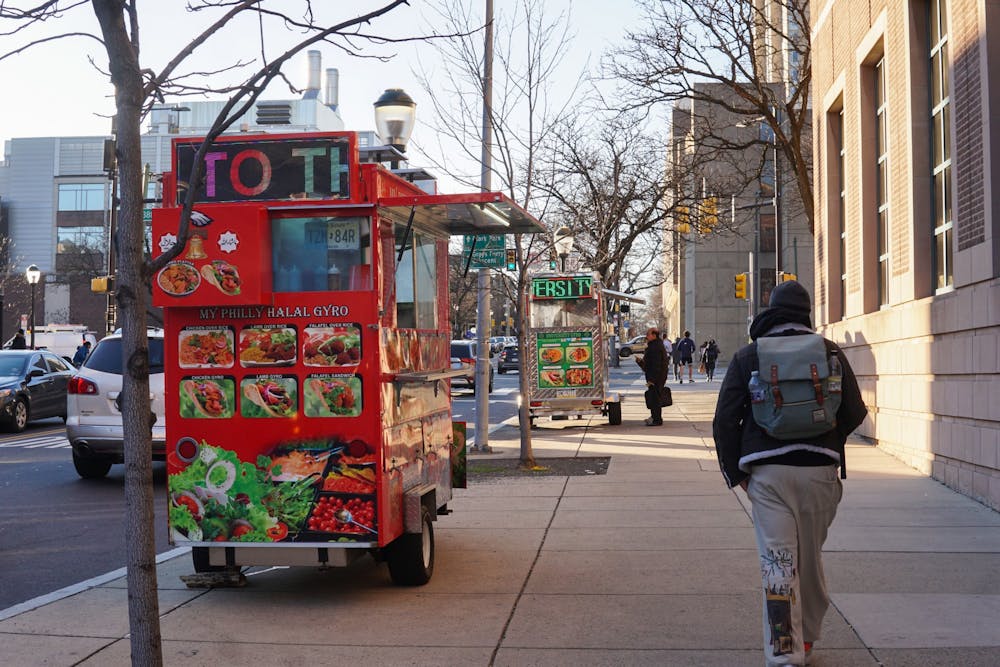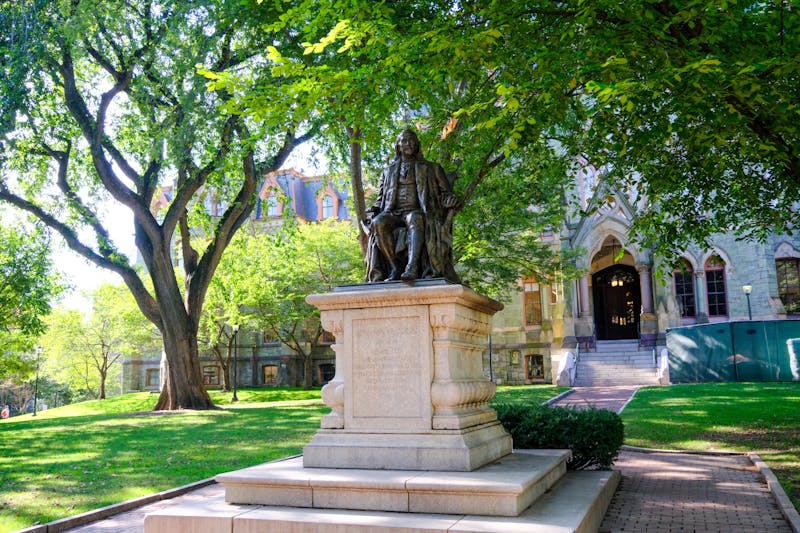
Food trucks near Penn's campus account for less common cuisine offerings on campus and among brick-and-mortar restaurants in University City, a Daily Pennsylvanian analysis found.
The analysis — which examined 45 food trucks and 72 restaurants near campus — found that 41% of food trucks on or near campus offer Halal food, compared to 2% of on-campus restaurants. On the other hand, restaurant cuisine is more varied, with the most common cuisines for restaurants being "American and “Coffee and light fare," each of which makes up only 15% of food offerings.
41% of food trucks near Penn's campus serve Halal food
No cuisine dominates among brick-and-mortar restaurants in University City
Though food trucks have long been a part of Penn’s dining culture, they have also been a part of a growing trend across college campuses. Penn’s food trucks have a significant impact on student life, leading to the University being cited as one of the best colleges for food trucks in Philadelphia.
Over 40 food trucks serve the area between 42nd and 32nd streets and Market and Spruce streets. Outside of the Halal category, common options for food trucks include breakfast, Asian fusion, and Mexican menus.
Critical Writing Program lecturer DaJuan Ferrell, who teaches the writing seminar “Let’s Talk About Food,” said that students tend to visit food trucks and other off-campus dining locations because they are attempting to learn more about their surroundings through food.
Ferrell also said that the prevalence of food trucks on campus likely stems from a mix of wanting to explore off-campus dining options and a desire to eat food that is associated with positive experiences and memories.
Mapping food trucks around Penn's campus
College senior Rachel Harris said that Lyn’s breakfast food truck, located at 36th and Spruce streets, offers her the “closest thing in Philly” to the bodega egg and cheese sandwiches she associates with her home in New York. For Harris, the other diverse food truck offerings allow her to try foods from other parts of the world that she would not have tried otherwise.
Harris also described food trucks as “less of a pain in [her] pocket” than nearby brick-and-mortar restaurants.
Although 15% of students admitted to the Class of 2024 and Class of 2025 identify as first-generation low-income, and nearly 50% receive financial aid, just 37.5% of restaurants on campus were found to exist in the lowest price range available on Google Maps, indicating a meal that usually costs less than $10. By contrast, all food trucks listed on Google Maps are within the lowest price range, and trucks unlisted on Google Maps have comparable price points.
In addition, the majority of restaurants with international cuisines are only available in higher price ranges. The most common restaurant cuisines available in the lowest price range are American, coffee and light fare, and pizza. By contrast, Chinese and Japanese restaurants were among the most common in the next highest price range.
With 13% of Penn undergraduates being international students, the varied cuisines of food truck options additionally provide a higher probability that these students would find familiar and accessible foods in food trucks rather than in off-campus restaurants.
The analysis also compared the times of day during which food trucks and restaurants are open. Most dining halls remain closed over the weekends or have reduced hours, and some restaurants either reduce hours or close on these days. By contrast, 73% of Halal food trucks around University City are open on Saturday and Sunday, and they remain open continuously from their opening to closing times.
Food trucks open over the weekend
Despite their prevalence on campus, food truck owners have struggled to remain in business over the years, and particularly over the course of the COVID-19 pandemic.
Noni's Kitchen, a popular food truck outside of David Rittenhouse Laboratory known for its Asian fusion cuisine, is one such business. Its owner, who identified herself only by her first name, Noni, said that food truck owners “cannot choose” their location, and despite the popularity of the trucks during the academic months, the fact that truck owners are “dependent on the students'' slows business in the summer months.
However, Noni said that “not working for anyone” has allowed her more creativity.
“We make what students like," Noni said. "They come for breakfast; we make breakfast.”
To conduct the analysis, the DP visited and recorded data about 45 food trucks located in the rectangular portion of University City stretching from 33rd and Market streets to 42nd and Spruce streets, asking or collecting the name, cuisine, location, and hours of the food truck. Only food trucks present during data collection, which took place during daylight, were counted. The DP also recorded data about local restaurant offerings.
The Daily Pennsylvanian is an independent, student-run newspaper. Please consider making a donation to support the coverage that shapes the University. Your generosity ensures a future of strong journalism at Penn.
Donate






